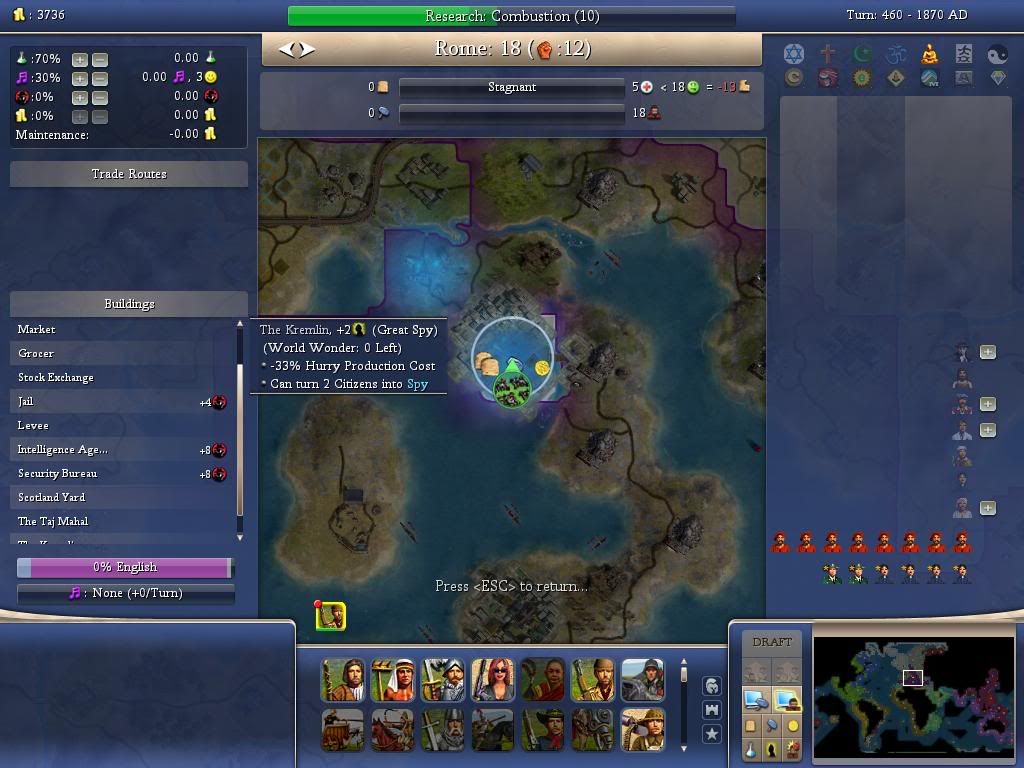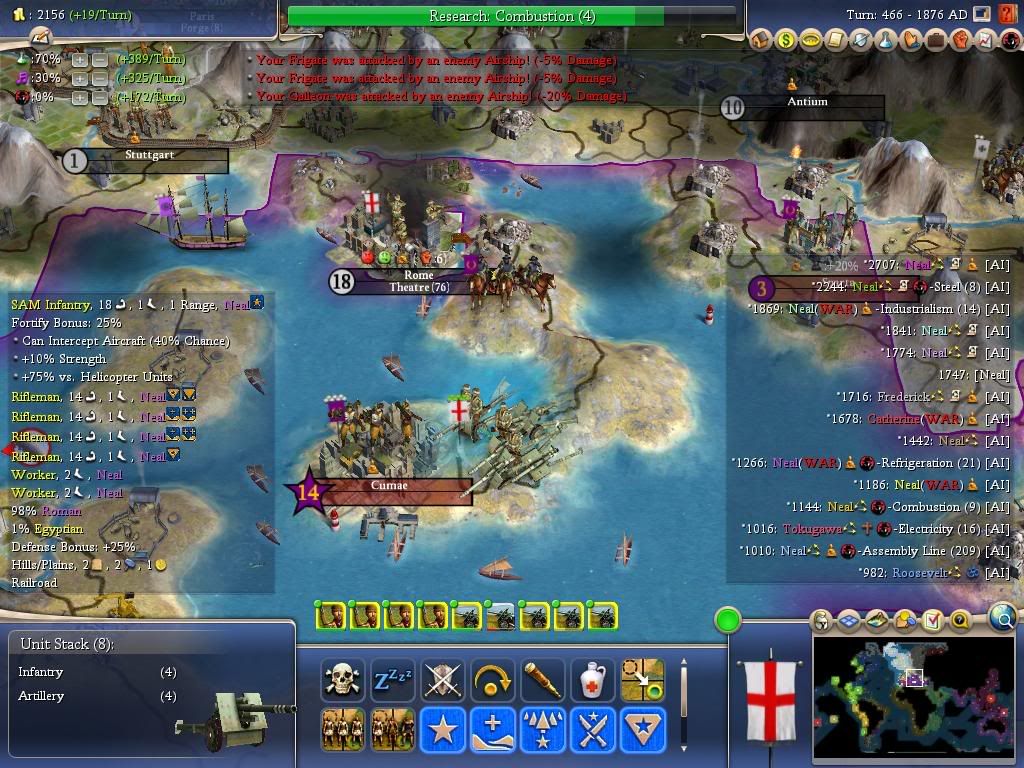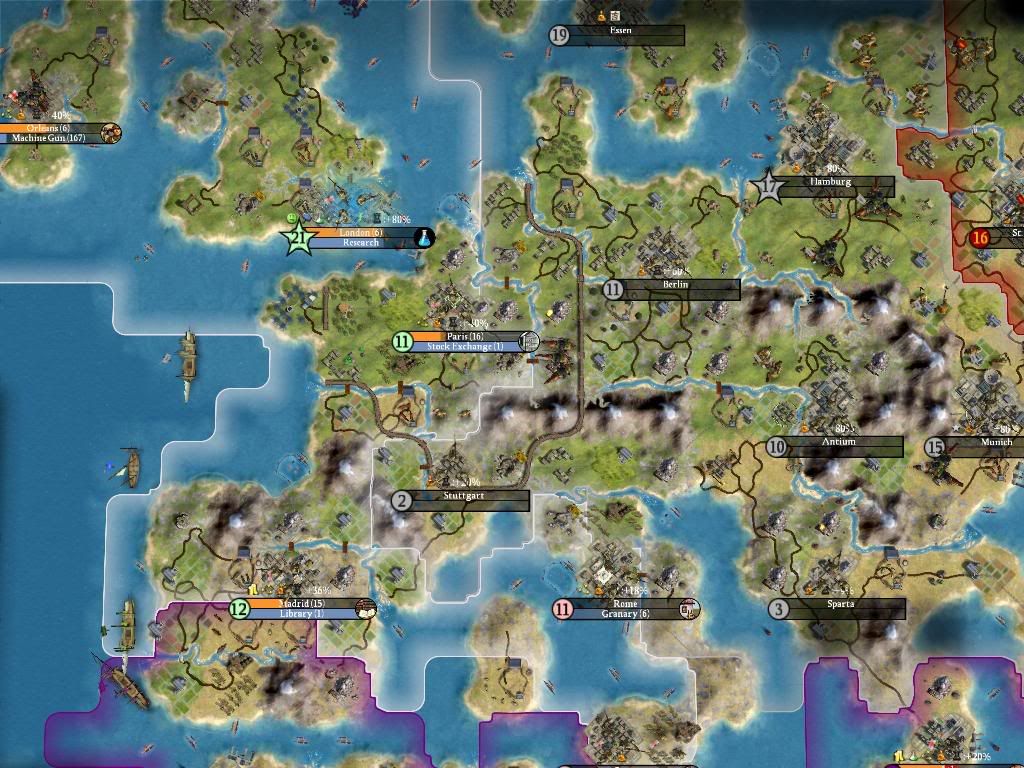A stunned hush fell over the Conference Room crowd as the Virgin Queen stepped up to the assembled microphones in full military dress, complete with Infantry helmet. "Fellow Britons," she began, an initial quaver in her voice quickly steadying into certitude. "Every generation must ultimately make a decision that will decide its legacy, for good or ill. Friends, that time for us is now. For millennia we have languished in our island homes, forced to subsist on haggis and mushy peas while the
Romans," and this word dripped with icy venom, "dine on the finest meats and cheeses in the bistros of Paris. We humbly worship at our Buddhist shrines and pay our tithes in hopes of escaping the cycle of Samsara. But where do these tithes go? Do they pay for our priests and our monks? Do they
in any way serve to enrich our communities? No. They are funneled directly into Julius Caesar's coffers in Madrid. Caesar, who had personally seen to the butchery of St. Isabella of Spain, now grows fat off the profits of her piety. Now grows fat off the profits of
our piety!"
The gathered journalists and dignitaries blinked at the sudden silence. A reporter from the
London Times slowly stood and politely waited to be recognized. "Your Majesty," he began, "are you recommending tarriffs? Trade Embargoes? Because, as I'm sure you are aware, the English are a peaceful..."
"I recommend nothing. The English are going to war. Our Factories have been ordered to turn out Cannons, and University deans are busily applying our knowledge of Physics to them in order to retrofit them into Artillery. Our Infantry far outclass Roman Riflemen, but they have the edge in Siege warfare. I aim to erase that edge. To further the goals of military mobilization, I am also announcing sweeping governmental changes. I am stepping down as your queen, though I will be staying on as an 'advisor' to the new Democratic government. I am also instituting a draft. The English army is sorely lacking in manpower. I aim to change that."
By this point, the shock had worn off, and the silence was shattered with shouts of outrage. Neal had gotten his message across. Extending the press conference further would be a waste of time. He retreated behind the curtain, and ordered the Infantry guards to "escort" the gathered press corps from the premises. He had work to do. England would go to war, but was, frankly, not ready for it. Not a single siege weapon sat on Brittania. England had Infantry, and ships, but not nearly enough to take Europe. The 10-year plan was sound, though. With enough cash to turn out Cannons, and English farmhands to conscript into Infantrymen, Neal felt confident that he would rule the continent before moving on.
Neal's cash reserves were epic, but he felt he would need more. He contacted the unsuspecting Roman leader, offering to improve the quality of Roman Farms for a reasonable fee:
The King (Queen?) of the World chuckled. "Yes, you old fool... fatten up those cities for me..."
In 1851, as the island descended into panicked Anarchy and the English home guard began shuttling south to Brittany, a secret order was sent out from London. In the dead of night, one of the Galleons bearing veteran troops diverted its course to the French Isle Emeraude:
In the morning, the press and international community woke up to find that Ireland was now an English protectorate and Louis XIV wasn't returning any calls for comment. A lame excuse involving a sudden heart attack on the French monarch's part was floated to the press, and any reporters who dared to dig deeper found their names conveniently drawn for conscription.
The next year, the thorny American war finally came to an end:
Perhaps the enlightening tenets of Democracy would serve to soothe the savage Aztec. Likely not, but the "tribute" was accepted by the brutes, who hooted and hollered at their "grand victory." Perhaps war with Rome was premature. Perhaps it was the Americas, not Europe, in need of "Rex Britannica." Ah, well. By this point, wheels were set in motion. The people had been promised war with Rome. The people would get war with Rome.
When Russian emissaries came to visit, it was immediately obvious that they came seeking a handout:
They were turned out as beggars and ruffians and little more was thought of them. Neal's plan for England was ambitious, but not foolhardy. The war was to include only Rome. The troops were not to press into Germany, much less Russia. Caesar, having lost his colonies in Siberia and the New World, was weak, but Catherine and Frederick were strong. There was no need to pull the tails of sleeping lions.
Five years later, however, our spies in Rome reported a Russian fleet slipping past the Sicilian city of Cumae:
And Catherine's terse replies to English inquiries implied that she was preparing for war ("We have enough on our hands right now"). Neal had enough experience to know that Russia was not ferrying troops for war in Eurasia or Africa. World leaders were reluctant enough to do such a thing when it made sense, much less when roads and the emerging rail networks could move materiel so much more efficiently. No, Catherine had her eyes either on Montezuma or a conveniently-located island nation off the coast of France.
Neal's suspicions were confirmed by the tone of Catherine's next "request":
At this point it was merely delaying the inevitable, but Neal relented. Ten turns of peace was ten turns in which England could prey upon Rome without interruption.
A few more troops were transferred across the channel and war was declared:
The troops rolled easily into Paris, where the Cannons were upgraded to Artillery (I found it odd that they couldn't upgrade in Brittany, despite that being English territory. Does there need to be a road route to a friendly city?). The wonders of Paris had dulled a bit over the centuries (Caesar was much less keen on beautifying the city than Louis has been), but it remained one of the map's biggest prizes.
As the first shipment of crepes arrived in London's Harbor, a land force was heading south towards Rome and an amphibious landing into Spain was in the planning stages. Qin Shi Huang, imperialist cur that he is, declared England's quest for lebensraum to be unjust:
Screamer headlines in
The London Times declared "Queen Elizabeth a Villain!" and the religious who had previously supported the war to liberate Madrid threatened to halt research and production altogether with their protests and sit-ins. Attempts to quell this resistance with the use of troops was only met with more indignation by the populace.
This gross breach of international etiquette also brought on the wolves from outside England's borders:
Even Montezuma, adept as he always is at smelling blood in the water, managed to extort Biology from the crown.
The worst betrayal, though, came as the walls of Madrid were about to topple:
Caesar, seeing that his empire was lost, threw himself on the mercies of Arabia who, along with his lapdog Hatshepsut, promised to come to Rome's rescue. Arabia was, in this game, no bottom-feeder. He was master of Western Africa and the Middle East, a technologically advanced titan. Things were looking grim. Nothing to do but press on, though. Madrid's financial institutions (a Market, Grocer, and a Bank turned Stock Exchange) survived the military takeover, as well as a 94

shrine and a Military Academy staffed by no fewer than three Great Generals.
Rome fell the same year:
And England shifted to a defensive mode, to fend off the inevitable Arabian strike.
As it turns out, Arabia wasn't the only threat to worry about. With a wink and a smirk, the inevitable came calling:
Catherine spouted all sorts of nonsense about "aiding her brothers in the faith" and "smiting the infidel." Neal countered with his spies' reports that Russia was moving troops in long before Rome had been attacked. Of course, that only brought up questions of why there were English spies in Sicily at the time, and Neal relented. International affairs had clearly become a popularity contest which he was not going to win. Thankfully, Frederick was rather level-headed and, while he permitted both sides to move troops through his territory, he refused to join in the conflict.
In thanks for this (and to beat back Roman borders), Neal launched an amphibious invasion of Berlin:
And returned it to German control. The German population there, having lived for a millenium as a Roman outpost as Caesar and Frederick became allies and a war of reconquest became less and less likely, were finally restored by a most unlikely force. Neal's reasons were simple. With Germany taking a wholly
laissez-faire approach to the war, Berlin was better in neutral hands than those of the enemy. And, besides, there was no way the small raiding party could hold out against the massive force of Cossacks sighted outside city limits. Finally, Neal knew that he would be wearing the Kaiser's boots soon enough, so he was willing to give any reasonable aid he could to the Germans. The Cossacks were dispatched without difficulty by the Parisian garrison, and, beyond that, Catherine's efforts amounted to little more than occasional raids.
The Roman government retreated to Cumae, where it was crushed in 1876:
From there, Caesar fled to Neapolis, on the African side of Gibraltar. Neal parked his fleet there, mostly to guard against an Arab strike at Britain, but also to keep an eye on the shattered, desperate Roman government. You can also see that Germany took advantage of our open borders and kindly disposition and founded Stuttgart, a city that promised to be a thorn in England's side for years to come.
In a final offensive, Neal sent an army to take Sparta. After a quick and easy battle, the forces found themselves face-to-face with the dreaded incoming Arab juggernaut:
And that stack is after most of the Arabs were defeated or held up taking first the hill to the north of the city and then assaulting the city itself. There was no way Neal could hope to hold out, so he graciously offered it, too, to the German overlords and retreated his forces back to Paris.
Catherine was willing to accept a surprisingly reasonable price for peace:
Perhaps she realized that the age of Rifles, Cossacks, and Grenadiers was over, because she immediately sought to retool her armed forces.
The ragtag remnants of Saladin's army, meanwhile, having suffered harrying strikes throughout Germany, finally approached Paris:
They were decimated. They called a final retreat to Berlin, where the German authorities allowed English Infantry and Artillery to butcher them in the streets.
This brought Saladin, too, to the negotiating table, finally winning peace for the English empire:
The old crust initially demanded Madrid. Neal replied that he would sooner set the whole world ablaze before he would consider giving up the Mahabodhi. The secret of Communism was finally decided to be a fair price for a cessation of hostilities.
English newspapers screamed "Peace!" and the empire was much greater and more prosperous than it had been upon Neal's ascention to power, but there was still grumbling in religious quarters about the government's flaunting religious law, and foreign relations were in a shambles. The Virgin President's re-election campaign was no sure thing. That was just as well for Neal, though. He had turned a tiny island nation into, at least, a regional powerhouse:
Of course, one could say that Germany profited from that round even more than we did, but that wasn't my design.
Neal closed his eyes on one island nation and opened them on another:
Back to being an also-ran, he sighed as he glanced at the crude Riflemen standing guard and the Chinese "ambassadors" waltzing about the Palace like they owned the place. Kagoshima doesn't even have a Lighthouse! And we own one more city, on a single-tile island off to the east. So what do we do? What can we do? I figure that this will be a nice break to let the European situation gel a bit before our double dose of Frederick and Catherine, but I'd like to accomplish
something while we're here. Any ideas?






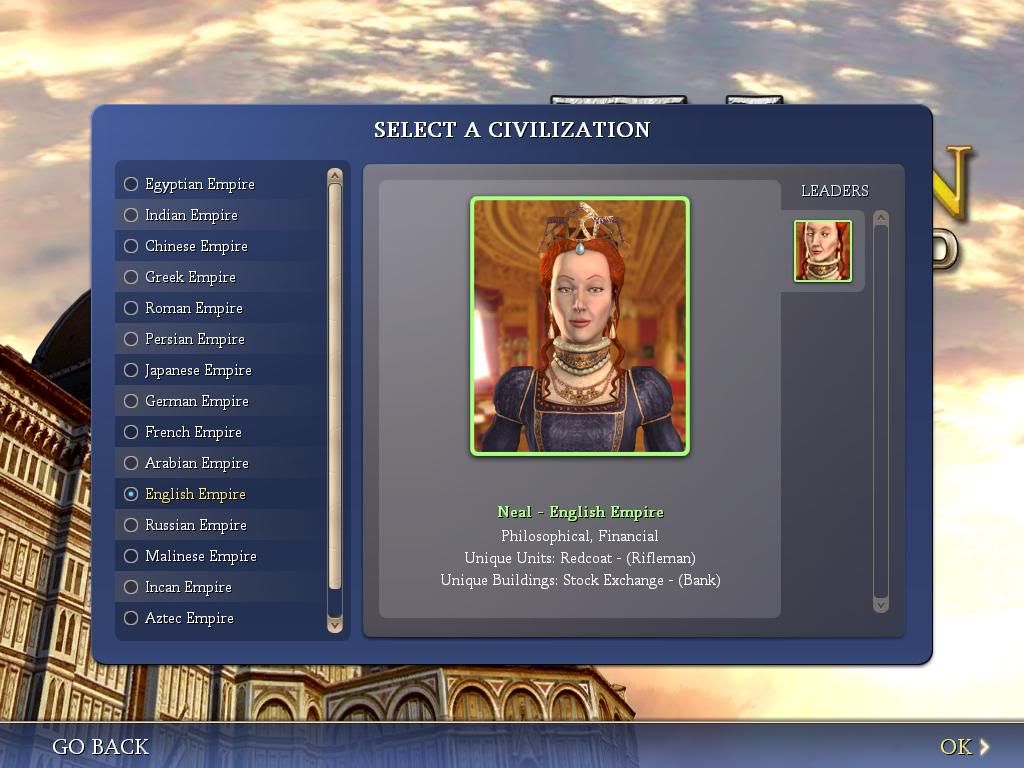


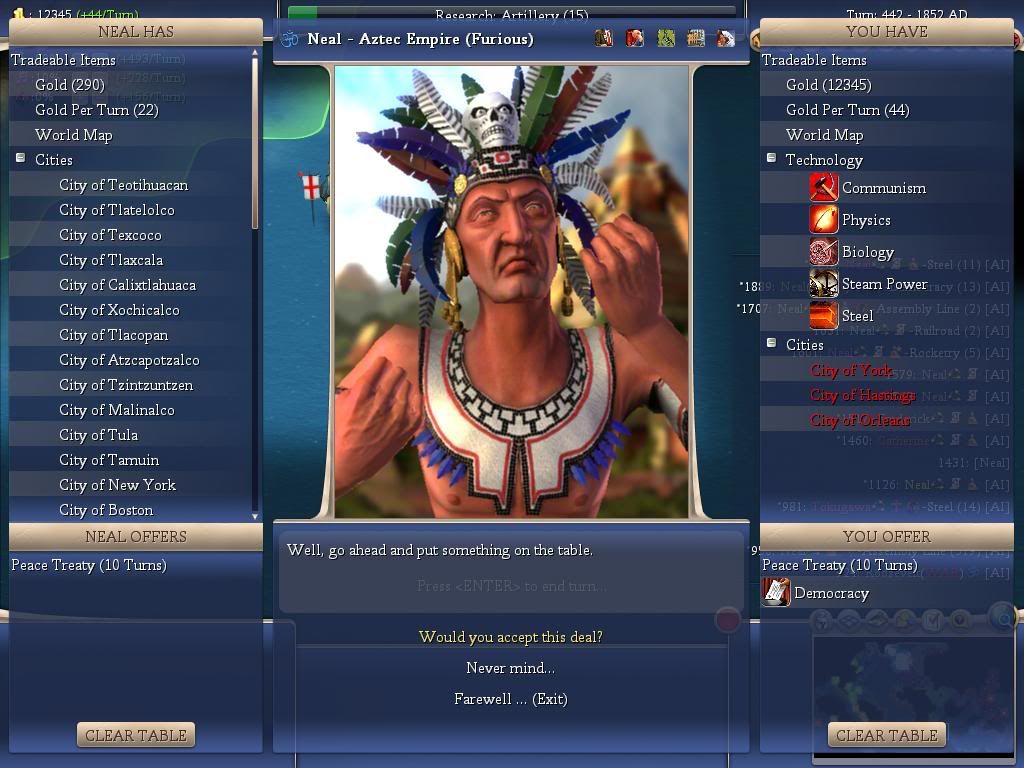
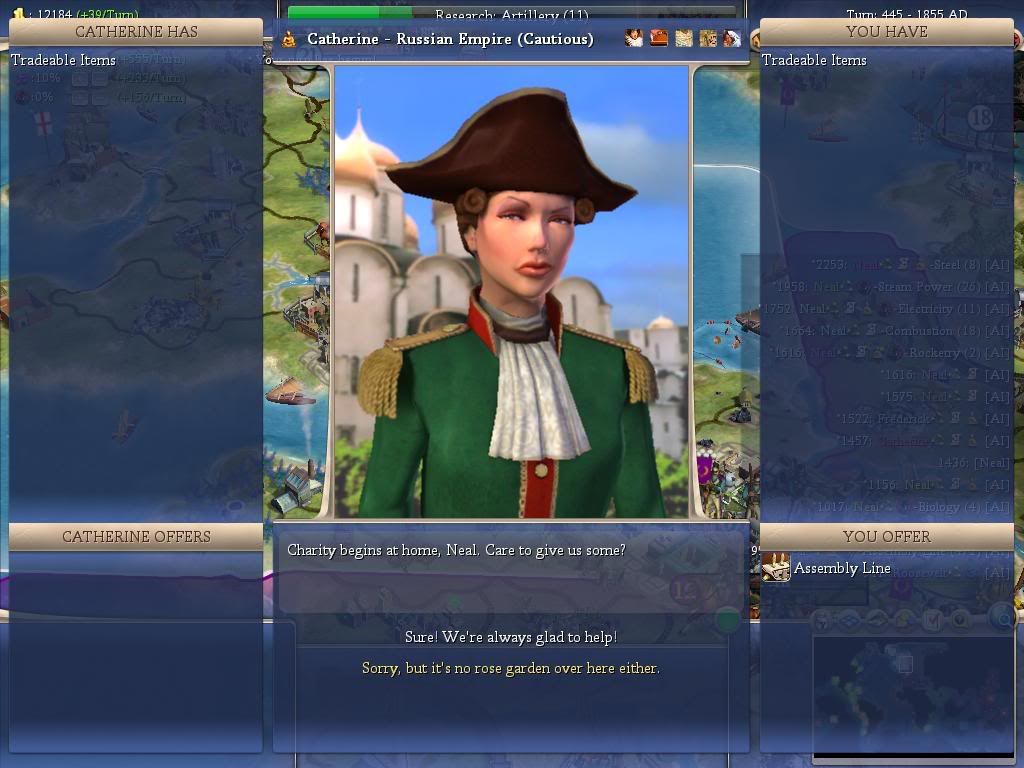




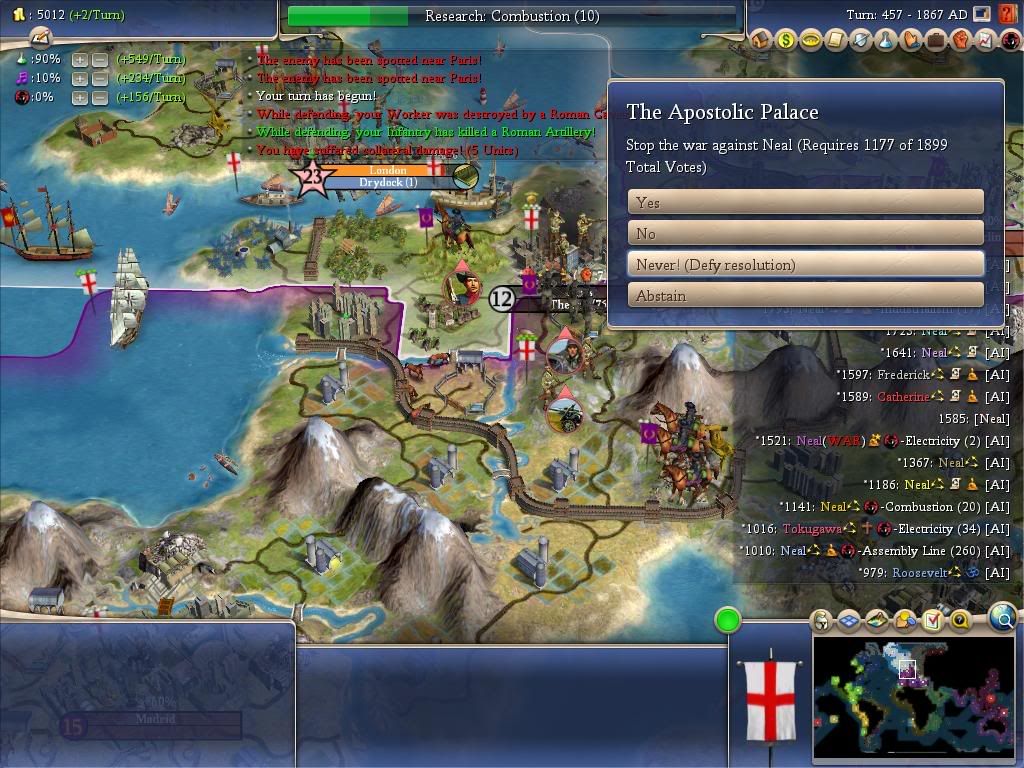

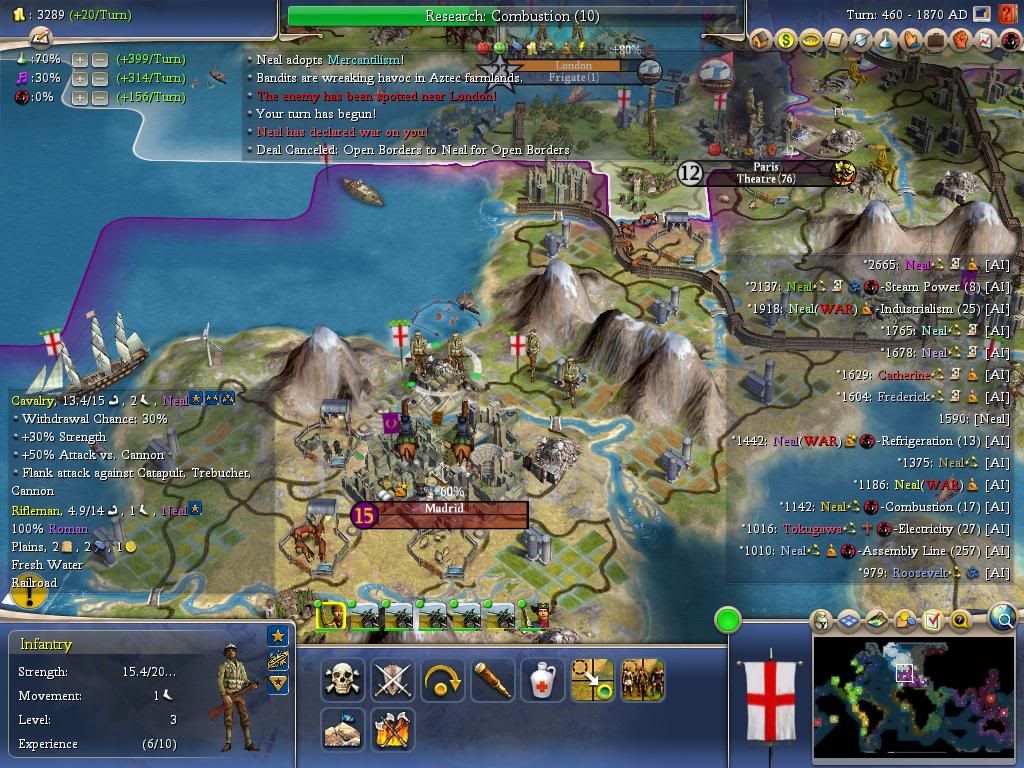
 shrine and a Military Academy staffed by no fewer than three Great Generals.
shrine and a Military Academy staffed by no fewer than three Great Generals. 